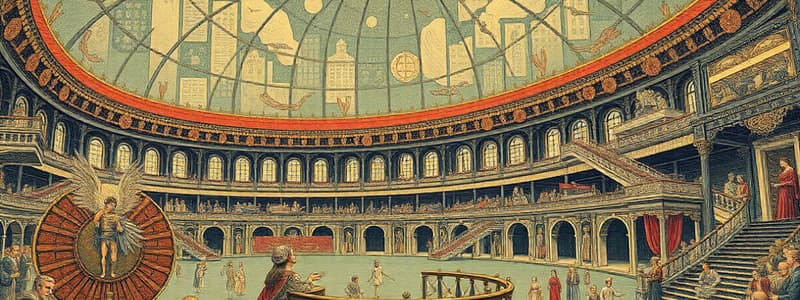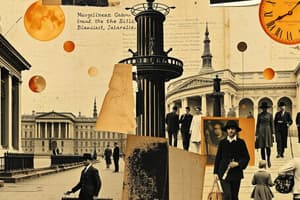Podcast
Questions and Answers
Which phrase reflects the importance of promptness?
Which phrase reflects the importance of promptness?
- WALK FAST (correct)
- RUN CAREFULLY
- STAND STILL
- WALK SLOW
What is suggested by the word 'CI' in the context provided?
What is suggested by the word 'CI' in the context provided?
- It denotes a type of mistake
- It's a correct term
- It's likely an acronym (correct)
- It represents a location
What does 'IMPORTANT' imply in terms of prioritization?
What does 'IMPORTANT' imply in terms of prioritization?
- It is optional
- It should be ignored
- It holds significant value (correct)
- It is of little consequence
Which of the following actions contradicts the idea of urgency?
Which of the following actions contradicts the idea of urgency?
What tone does the directive 'WALK FAST' convey?
What tone does the directive 'WALK FAST' convey?
Flashcards
Walk Fast
Walk Fast
To move quickly on foot.
More Important
More Important
A word that means more important.
Wrong
Wrong
A word that means incorrect or wrong.
CI
CI
Signup and view all the flashcards
Amore
Amore
Signup and view all the flashcards
Study Notes
Enlightenment and the History of Sports
- The Enlightenment, or "Age of Reason," was a historical period from the late 17th century to 1789. It emphasized reason, critical thinking, science, and progress.
- This period responded to the rigid structure of Ancien Régime society; the rise of the bourgeoisie, international trade, and the Scientific Revolution fostered a supportive environment for new ways of understanding the world.
- The Enlightenment saw the emergence of a new intellectual elite—philosophers, scientists, writers, and thinkers—who advocated for positive societal changes, emphasizing reason and merit.
- Notable figures included Diderot, D'Alembert, Voltaire, Rousseau, etc. who met in academies, societies, and cafes to discuss ideas.
- Enlightenment thinkers influenced monarchs to adopt "Enlightened Despotism" in an attempt to reconcile absolute authority with the revolutionary ideas of the time. This style of rule implemented reforms for the good of the people, but without the people's direct participation.
- Despite the unilateral reforms, significant advancements occurred in the economy, administration, justice, and education during this era
- Education underwent a significant transformation in the 18th century thanks to the pursuit of knowledge, reason, and progress.
- There was a movement to make education more accessible to a wider range of people and not just the elite or religious institutions.
- Physical education became understood as fundamental to personal development (character, health, and morality).
- The new educational ideas were organized into major movements, such as naturalism, rationalism, and philanthropism.
Naturalism
- Philosophers and educators of this movement emphasized nature as the foundation for all knowledge and reality.
- Educational approaches focused on returning children to natural environments to promote growth through direct experience and interaction
- Significant authors include Rousseau and Helvétius.
Rationalism
- Philosophers of this movement stressed the importance of reason as the sole source of knowledge.
- They advocated for critical thinking, scientific observation, and reason to understand the world.
- Kant is a notable author.
Philanthropism
- This movement aligned with Rousseau's naturalism but took a more structured approach.
- It emphasized the need for clear curricula and educational objectives in education.
- Notable authors include Basedow, Guts Muths, and Pestalozzi
Jean-Jacques Rousseau
- He developed the "Natural Method" or "Natural Education" which advocated for eliminating schools to create a more natural and self-directed learning environment.
- He emphasized the importance of respecting the child's natural developmental process, with a strong emphasis on physical education through free play and exploration of the physical environment.
- His most influential pedagogical work is "Emile, or On Education," describing a comprehensive educational program.
- Stages of development are important: physical, exploration, developing reason, developing character, integration into society and religion (if chooses so)
Claude-Adrien Helvétius
- An important figure of the Enlightenment who stressed the significance of the social environment on human development.
- He believed education plays a crucial role in shaping individuals' abilities and behaviors, and all beings start with similar potential.
- He argued for including physical exercises in education.
- Emphasized the importance of physical exercise.
Immanuel Kant
- While praising Rousseau, Kant emphasized a more disciplined and reasoned approach to education focusing on developing reason and morality.
- He believed physical education could help individuals acquire discipline and control over their instincts.
Johann Bernhard Basedow
- A key figure in the practical implementation of Enlightenment educational ideas, inspired by Rousseau.
- Established the Philantropinum school in Dessau, Germany, which was groundbreaking in its acceptance of students of all genders, religions, and social backgrounds.
- Introduced physical education as an important part of the curriculum.
Johann Friedrich Guts Muths
- A key figure in the development of modern physical education.
- His work, like the Gymnastics for Youth, provided well-structured and documented information, and guidelines for the practice of gymnastics.
- He emphasized the value of physical exercise and camping expeditions.
- His works reflected nationalistic ideals that physical education was beneficial for the well composed citizen.
Johann Heinrich Pestalozzi
- A Swiss educator of the Enlightenment promoting a holistic approach to education that involved the mind, body, and spirit.
- He championed inclusive education, arguing that education should be accessible to all, even poor families.
- He emphasized the importance of respecting the child's natural developmental processes and learning through experience and play.
- He integrated physical education and manual labour into the curriculum.
Gaspar Melchor de Jovellanos
- A Spanish writer, jurist, and politician who introduced Enlightenment ideas to education in Spain.
- He advocated for universal access to education regardless of social status, and a three-level system (primary, secondary, and higher).
- He stressed the importance of moral and civic education, and supported the inclusion of physical education as an essential subject in improving natural human movements.
The Origin of Sports Associations
- The formation of sports associations and clubs, particularly in England, played a significant role in codifying and formalizing the practice of sports.
- Social networks and increased social status were often a motivation for participation.
- The formalization of standardized rules was instrumental in the structuring and growth of sports.
- The development of sports grounds and public spaces further promoted participation and increased public interest in sporting events.
Boxing
- Modern boxing evolved in 18th-century England from the noble duels.
- Early boxing contests were characterized by the increasing inclusion of structured rules and the broader participation of spectators.
- Figures like James Figg and Jack Broughton shaped the transformation of boxing into a sport, introducing structured rules and techniques to promote safety and better performance of boxers
Cricket
- Cricket, emerging in the 18th century, formalized its rules and structures through the establishment of clubs.
- The standardization of rules led to greater popularity, and cricket clubs became important social spaces.
- Early women’s involvement in cricketing demonstrates a wider societal involvement in the emergence of sports.
Pedestrianism
- Pedestrianism, or footraces, gained popularity in the 18th century.
- Betting on these events became increasingly prevalent, attracting broader participation in the sport.
- Races sometimes involved individuals from different social classes and became widely publicized events.
Studying That Suits You
Use AI to generate personalized quizzes and flashcards to suit your learning preferences.




